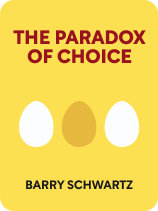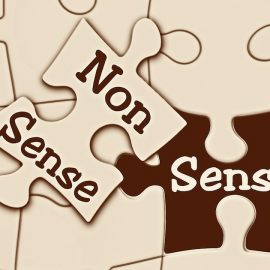

This article is an excerpt from the Shortform book guide to "The Paradox of Choice" by Barry Schwartz. Shortform has the world's best summaries and analyses of books you should be reading.
Like this article? Sign up for a free trial here .
What are the major consequences of dealing with regret? In what ways can regret affect our ability to make decisions?
Other than the obvious consequences of feeling sad when you regret something, regret can have more detrimental effects on your mental health. Two consequences of regret are developing regret aversion and avoiding sunk costs. Additionally, the more options you have to choose from, the worse the regret will feel.
Keep reading to learn all about regret.
The Consequences of Regret
In the book The Paradox of Choice, author Barry Schwartz notes that, while regret has several distinct causes, what we notice most in our lives are its negative effects. Dealing with regret can carry consequences detrimental to our decision-making and emotional health.
Regret Aversion
Schwartz asserts that one of the major consequences of regret is regret aversion: making choices with the primary goal of avoiding regret.
Regret aversion is related to the concept of risk aversion, an aspect of prospect theory. People tend to avoid risk when making choices, even if the upside of the risk is highly positive. Regret aversion is a type of risk aversion. If faced with a choice between two options—a “safe” option we know what to expect from and a risky option with potential upsides—most people would choose the safe option to avoid regret.
Schwartz points out that regret aversion can also cause people to delay making decisions—called inaction inertia—due to the potential for regret. Meanwhile, they miss out on the more attractive option and are faced with deciding on a less attractive one. Again, they put off a decision, and the cycle continues.
For example, imagine a new digital camera is on sale for 25% off. You want to buy it, but you’re concerned it’s still too expensive for a product that might not totally satisfy you. You wait too long, and after a week it’s no longer on sale. You still want the camera, but now you can’t justify buying it because you didn’t get it while it was on sale.
The ultimate consequence of decision avoidance can be regret for failing to make a choice. Inaction inertia, therefore, doesn’t prevent regret at all.
| FOMO and Regret Aversion One example of regret aversion you may have encountered is FOMO—the “fear of missing out,” often triggered by social media posts showing others having a good time. When you experience FOMO, you’ll likely make commitments you don’t want to make for fear you’ll miss something memorable. This is a classic case of regret aversion. Instead of choosing something you actually want, you’re choosing something to stave off future regret. If you struggle with FOMO, it might be helpful to think of what you actually want in the moment, as opposed to what you think you might want in the future. |
Avoiding Sunk Costs
Regret also causes us to avoid “sunk costs,” or wasting resources we’ve already committed. Logically, we should base decisions on what’s best for us in the future. However, as explained in Chapter 3, we frequently do things we don’t necessarily want to because we’ve already committed ourselves and want to justify it. For instance, if you buy a movie ticket a week in advance but don’t want to go to the movie when the time comes, you’ll most likely go anyway because you purchased the ticket.
Schwartz argues that the desire to avoid sunk costs stems from feelings of regret and responsibility. Since we already made a choice or investment, we follow through to avoid regretting the decision (as previously noted, this type of thinking is known as the sunk cost bias). But we don’t satisfy ourselves, or even avoid regret, by trying to justify choices we made in the past.
| High-Stakes Sunk Costs Schwartz discusses the sunk cost bias in the context of individual choices, but organizations can also succumb to the sunk cost bias, with significant consequences. A high-profile example of a large organization falling victim to the sunk cost bias is Walgreens, which maintained a partnership with the fraudulent blood-testing company Theranos even after suspecting Theranos’s testing equipment didn’t work. In Bad Blood: Secrets and Lies in a Silicon Valley Startup, John Carreyrou details how Walgreens gave in to sunk costs. When Walgreens began to have doubts about Theranos’s technology, it didn’t cut ties, in part because it had already spent a significant amount of money on building clinics and didn’t want to back out of a high-profile commitment. |
How Expanded Choice Worsens Regret
Schwartz contends that expanded choice, and the maximizing tendency it encourages, amplifies regret.
With expanded choice, virtually every decision we make has many options. Since there are many options, there are many opportunities to make a choice that will cause regret. Expanded choice increases regret by making bad choices more likely.
Schwartz notes that an increase in choices also implies an increase in opportunity costs. Increased opportunity costs means that every decision entails many alternatives to weigh, creating potential anticipatory regret and post-decision regret: You worry that you’ll make the wrong choice, and once you’ve chosen, you wish you’d chosen an alternative.
Regret is a much more potent issue for maximizers when there is expanded choice. Aiming to choose only “the best” will create regret whenever a chosen option isn’t completely satisfactory, which is almost all of the time. Satisficers, since they are content with “good enough,” don’t regret their choices as often as maximizers.
| Maximizing and Regret Studies have shown that regret is one of the key negative impacts of maximizing. One study even suggested that quality of life for maximizers is affected only when the maximizer feels regret. Because maximizers don’t have consistent standards, and instead constantly consider what better options there are, they have the potential to regret any decision they make. Thus, maximizers feel regret constantly. This can lessen quality of life, because significant regret can harm mental health, causing anxiety, depression, and dissatisfaction. Therefore, learning to be a satisficer has the potential to lessen regret and improve satisfaction with your life. If you’re a maximizer and struggle with decision regret, try taking steps to satisfice, like setting standards, making firm decisions, and accepting options that are “good enough” instead of perfect. |

———End of Preview———
Like what you just read? Read the rest of the world's best book summary and analysis of Barry Schwartz's "The Paradox of Choice" at Shortform .
Here's what you'll find in our full The Paradox of Choice summary :
- Why the more choices we have, the more stressed and indecisive we feel
- How to better navigate our choices, from groceries to health insurance
- Whether it's better to seek the best or accept "good enough"






